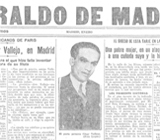Q: César Vallejo, why have you come here?
CV: Well, to drink coffee.
Q: How did you begin to drink coffee in your life?
CV: I published my first book in Lima. A gathering of poems title Los heraldos negros. It was the year 1918.

Vallejo: Heraldo de Madrid
César Vallejo
César González-Ruano
Translated by Kent Johnson, Andrés Ajens
December 2014
He pulverized normative syntax, spelling, and punctuation…
Mónica de la Torre
This broadsheet offers the first full translation into English of the only extant interview with César Vallejo (1892–1938), one of the centripetal authors of avant-garde modernism. The 1931 text, lost for nearly four decades, is the single record we have of the great poet’s “conversation,” which suggestively registers here, by turns, as laconic, cleverly ironic, diffident, and direct. Given its open availability for some twenty-five years, it’s astounding that such an artifact has not yet been fully rendered into English. In his translation, poet Kent Johnson has captured the nuance and coyness of Vallejo’s “answers,” and added to our appreciation of the poet with a new translation (done with Andrés Ajens, of Chile) of Vallejo’s “España, aparta de mí este cáliz,” the eponymous poem from the collection published by the presses of the Eastern Front of the Republican Army the year after the poet’s death.
About the Authors
César Abraham Vallejo was born in 1892, in the Andean village of Santiago de Chuco, Peru. He is internationally regarded as one of the great innovative poets of the 20th Century. He published two books during his life: Los Heraldos Negros (The Black Heralds) and Trilce, whose title has no translation. Two collections were published posthumously, under the titles España aparta de mi este cáliz (Spain, Split This Chalice off From Me), a sequence of poems in solidarity with the besieged Spanish Republic, and Poemas humanos (Human poems), in which a number of his famous prose poems are gathered. In 1923, fleeing charges of sedition, he sailed to Paris, and lived there, with exception of extended trips to Spain and the Soviet Union, until 1938, when he died of an unknown illness in dire poverty. Only a handful of people attended his burial in the proletarian cemetery of Montrouge. In 1931 he was interviewed by César González-Ruano for the newspaper Heraldo de Madrid.
César González-Ruano (1903-1965) was a Spanish journalist, poet, novelist, and biographer. As a poet, he was closely associated with the Ultraísta movement in Spain during the 1920s; as biographer, he published widely read books on Baudelaire, Zola, Wilde, and Mata-Hari. He and Vallejo would not have remained cordial for very long, for González-Ruano became an avid supporter of Franco at the outbreak of the Spanish Civil War.
Praise
Cesar Vallejo, a poet whose forthrightly dazzling inventions cloaked him like the disc of the sun, left his table talk on record only once. There is no question that Kent Johnson, our contemporary dark horse who, like Vallejo, does his variously brilliant work beyond the pale of the 'schools,' is the ideal translator for this exceedingly singular and true account.
Jeff Nagy, The Claudius App
In these pages, readers of Vallejo’s aggressively indeterminate Trilce might find dubious the poet’s self-characterized obsession with precision. Yet those suspecting all along that it was the very grindstone with which he pulverized normative syntax, spelling, and punctuation—till no trace of arbitrariness remained—will find sweet validation. Herein the ultimate proof, straight from the horse’s mouth!
Mónica de la Torre
About the Translators
Kent Johnson is co-editor of Resist Much/Obey Little: Inaugural Poems to the Resistance and Homage to the Pseudo Avant-Garde, a collection of poems, both published by Dispatches Editions. In 2015 UDP released a pamphlet of his annotated translation of Cesar Vallejo’s only known interview.
Andrés Ajens is a Chilean poet and the author of the essay collection Poetry After the Invention of América (Palgrave Macmillan, 2011). He has translated Fernando Pessoa, Jean-Françios Lyotard and others into Spanish, and his poetry has been translated into English by Erin Moure. With the Bolivian writer D. Flores Chumacero he is currently working on an annotated translation of the Ataw Wallpap p’uchukakuyninpa wankan (“Cantar de la muerte de Atahualpa”), an anonymous Quechua text.
In the News
Publication Details
Broadsheet/Newspaper
Folded Broadsheet. 5 pp, 9 x 12 in
Publication Date: December 15 2014
Distribution: Direct Only
Series: Lost Literature #13